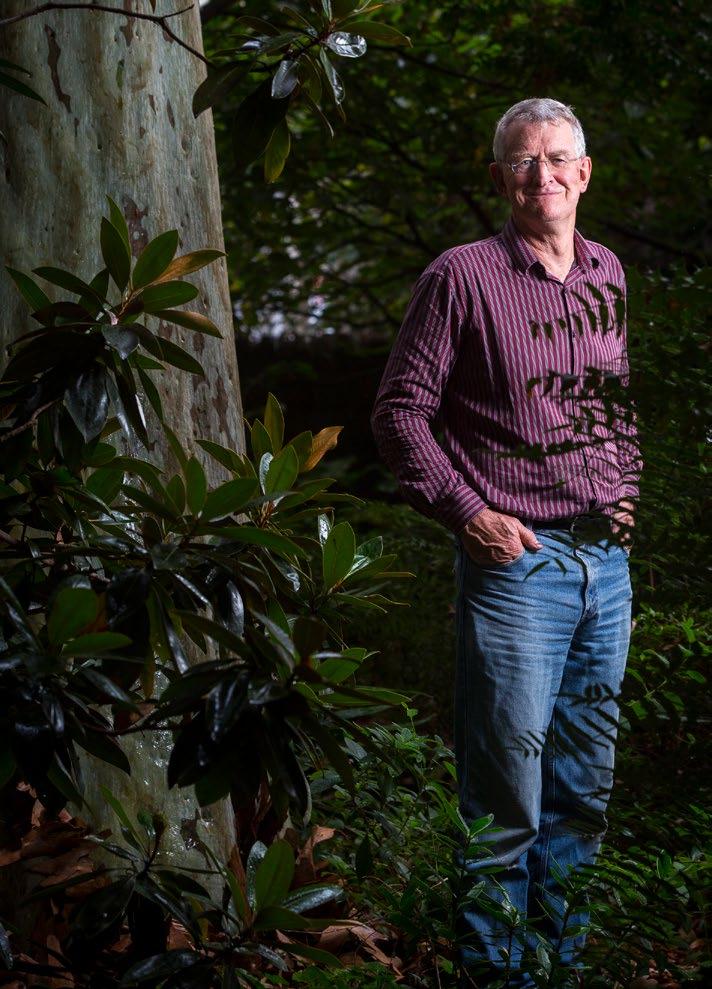
2 minute read
Driven by curiosity
Phil Beart has made a significant contribution to the world’s understanding of brain injury. He has modelled the way neurones can suddenly burst or die slowly –in disease and as we age. These days, however, he is investigating how we might protect our neurones in a most unexpected way.
It is hard to imagine how Phil will leave his office as he prepares to “semi-retire”.
AFlorey Institute stalwart, Professor Philip Beart, is supposed to be slowing down. The problem is, his ever-creative, constantly curious brain is yet to register that it can begin working at a walking pace.
As he reluctantly acknowledges he is semiretiring, Phil continues to discover new directions for his research involving chemistry, molecular assemblies, super foods, and cell death.
Phil has enjoyed a fascinating career and has contributed to medical research for more than 40 years. He has published more than 250 publications and been cited more than 8000 times. Phil has been central to at least 10 pharmaceutical patents in a career that has taken him from England to Boston, Paris, Copenhagen and other international science hubs.
This superfit 69 year old is a passionate advocate of a healthy diet and regular exercise regime. This partially explains his ongoing interest in so-called super foods. Could they really be good for the brain? While Phil is never going to simply throw kale into a morning smoothie and not consider why, he is delving into his background as a chemist to try and isolate the exact molecules that might have a positive impact on neurones.
The term “nutraceutical” was invented in 1989, to categorise foods that are healthy, but Phil has gone further, personally creating the word “neuro-nutraceutical” to define the naturallyoccurring molecules that might play a role in arresting or reversing major brain disorders ranging from autism to Parkinson’s disease.
A pioneering paper that he co-authored in 2005 established that naturally occurring antioxidants found in soy beans, red wine and tea could prevent brain cells from dying in cellular models of Parkinson’s disease.
“I don’t really work in that area but this paper has been cited more than 200 times,” he says.
In a recent turn of events, Phil, along with other members of his Friday afternoon science club at the Florey, discovered that an existing drug, Rilmenidine, may be useful in reversing the acute toxic effects of an MDMA (“ecstasy”) overdose, as Narcan is used for heroin overdose. The result? Yet another publication for this prodigiously curious mind.
In another of his many projects, with an Italian colleague, Phil is enthusiastic about the power of molecules found in the skin of red grapes. They would appear to enhance the function of ageing brains and muscle. The problem, however, is that Phil estimates we would need to drink 300 glasses of red wine to achieve the benefit. Luckily, it is now found in pill form, as resveratrol, available over the counter.
Phil takes resveratrol every day, and eats walnuts, sunflower seeds and pumpkin seeds as part of his breakfast, drawing on his neuronutraceutical research for his own health. It appears to be working in this admittedly small sample. Phil is sharp, agile and energetic, even though he is recovering from back surgery that has briefly halted his basketball and surfing and modified his yoga practice.
Phil has published more than 250 publications and been cited more than 8000 times.
His colleagues cannot see any sign of Phil slowing down. He’s involved in several grant submissions heading into the new financial year; he’s a mentor to younger Florey scientists and is the historian for the International Society of Neurochemistry.
Looking back, Phil considers himself lucky to have started his career when he did, finding grant money easy to come by when he returned to Australia with Cambridge and Harvard on his curriculum vitae.
“The path to research, and winning grant funding, is getting tougher and tougher,” he says. Luckily for the Florey’s mid-career researchers, Phil Beart is likely to still be around (most of the time) to guide and encourage.
Professor Beart will deliver a public lecture on the benefits of neuro-nutraceuticals on 1 November 2017. For more details, please visit florey.edu.au






